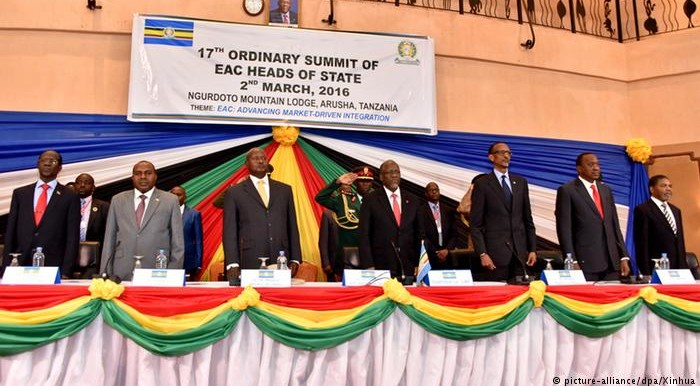South Sudanese opinion leaders have voiced their views on the decision by president Salva Kiir to admit their nation into the East African Community.
The East African Community (EAC) is a trade bloc initially founded by three east African countries before expanding its membership to include Burundi, Kenya, Rwanda, Uganda, and Tanzania.
Members of the EAC share certain economic and immigration policies for their citizens to promote free movement of labour, capital, goods and services within the region.
If the decision to join the EAC is ratified by South Sudanese parliament, the country would be obliged to change some of its national laws to allow the full implementation of some aspects of the Common Market such as immigration and customs.
Civil society leader Edmund Yakani said parliament should not ratify the treaty to join the EAC.
“Let them wait for some time. We are not saying it is bad idea to join but the time is not right,” Yakani said during a recent radio talk show.
‘We are not an island’
Charles Majak, a member of parliament from Twic state, said he supported joining the EAC, describing it as a win-win situation for South Sudan and its neighbors in the EAC.
“The decision to join is not bad at all. We are not an island. Countries thrives through cooperation, even in Europe, they are working together. That is why they have European Union and the Americans decided to bring different states together to form United States of America,” Majak said.
Still, Majak voiced concerns.
“There is too much fear that the country would be a dumping ground for other countries in the region. Those who came to us in the parliament are talking about movement of labour, movement of goods, especially substandard goods and services, those which have no markets or use in countries of origin in the region. These are the concerns we get and they are actually genuine concerns which must be examined carefully,” said Majak.
He was also concerned about timing.
“People develop faster and become stronger when they are united, but the argument I hear from our people is that the time is not right. We have had many people approaching us to express their opinions against joining now,” said Majak.
He said rushing to join the EAC may create an impression among the population that the government does things which are not approved by the citizens.
Poor public consultation
Presidential economic advisor, Aggrey Tisa Sabuni, who has been leading negotiator on behalf of the government, said the decision to join would come with some benefits to the economy of the country and set the standards for the rest of the world to follow.
He admits there could be some challenges in the short term but some benefits will be realized in the term if the membership is utilized properly.
Another issue is that many South Sudanese citizens do not know about the decision to join EAC or are not well-informed about its effects on their daily lives.
Ngor Kolong, South Sudan’s former minister of labour and public services, said opinions in favor of joining have shrunk considerably, but there are many who simply don’t know about it.
“If you meet a group of three people and ask them about what they think about this decision, you find may be one person may have heard about it but this person may have not understood it well,” Ngor said. “The rest say they feel too ill-informed to have an opinion. This is a difficult issue and it may fail if it is not guided with strong engagement of the public.”
“It requires a lot of publicity and consultation with the people,” he added.
The EAC was founded in 1967 but collapsed in 1977 before it was revived in 2000. In 2008, after negotiations with the Southern Africa Development Community (SADC) and the Common Market for Eastern and Southern Africa (COMESA), the leaders of East African Community agreed to an expand its free trade area, including the member states of all three organizations. The EAC is an integral part of the African Economic Community.




